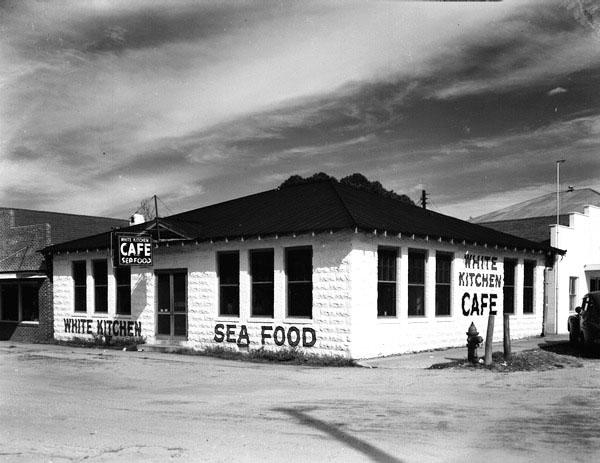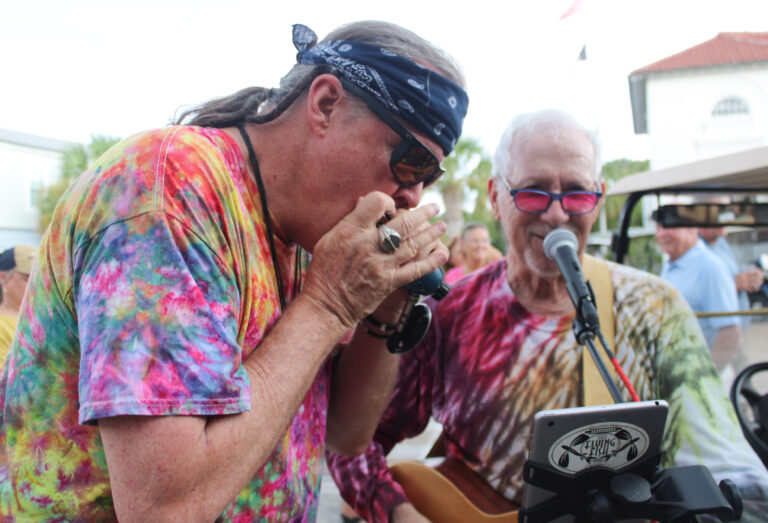Carrabelle plans to loosen downtown alcohol rule
Carrabelle city commissioners have set in motion a revision of a city ordinance that, if adopted, would make it more likely beer and wine could be offered at establishments downtown.
The proposal, made by Commissioner Bill Gray at the July 6 regular meeting, would change the way the distance, which would remain set at 500 feet, is measured between churches and downtown eateries.
Rather than being from property line to property line, “as the crow flies” so to speak, the proposed change would measure from the front doors of each building, and follow the legally permissible walking paths between the two places.
“We’re staying with 500 feet,” said Gray. “We’re going to measure it a new way, it’s called the way you walk.”
City Attorney Dan Hartman said an example of the effect of the change would be to First Baptist Church of Carrabelle, at 206 SE Ave A, which owns property that extends to U.S. 98.
As the measurement is currently made, the church’s property line would be 293 feet from the White Kitchen, a restaurant now being renovated at 210 Marine Street, and thus the eating establishment would be unable to secure a beer and wine license.
“If you changed and measured how you walk it, now he’s outside that 500 foot,” said Hartman.
Mayor Brenda La Paz noted that her review of the history of the ordinance shows discussions as far back as 1935, a year in which, interestingly, the name of the town marshall was Will Gray. She said the ordinance has been revised several times, most recently in 1961, 1966, 2010, 2012 and 2020.
Commissioner Keith Walden, who along with his fellow commissioners voted to advance the proposed change, indicated he did not see the change as significant. “I don’t see much difference, there ain’t that much difference,” he said.
Harry’s Bar, which dates back to 1937, has continued to serve beer, wine and liquor, as it was grandfathered in when the most recent changes were instituted, as was Carrabelle Junction. Fathom’s is outside the 500-foot buffer. One existing restaurant that could be affected by the change is Taste of Korea, now located at the corner of U.S. 98 and Marine Street.
Hartman said the proposed changes, which he has been asked to draw up together with city staff, would likely be “from entrance to entrance, to where patrons enter.”
The proposed change drew support from businesses that spoke out, led by the White Kitchen’s owner, Allen Russell. “That would be extremely helpful,” he said. “A lot of people in town have asked me about it.”
He said he had talked with officials at the Baptist church. “I don’t think it’s going to be a problem where it’s located,” Russell said. “We’re not trying to open across the street (from the church). Hopefully we can at least discuss it.”
Kimberly Wallace, general manager of Harry’s Bar, strongly supported the change. “I will advocate for this for the bitter end,” she said. “It’s about time these businesses are thriving.
“If they’re unable to serve beer and wine, to me it’s absurd,” Wallace said. “Threshold to threshold makes more logical sense, and I will advocate for it.”
Merrie Johnson, from Coastal Cottage Living collectibles store, also spoke in favor. “I think it would be a betterment for this community,” she said. “It will allow us to ‘grow’ a little bit without growing.”
In a related action, the commission gave its support for a request being made to the state by Ryan Brisban, owner of Mornin’ Bite, a breakfast and lunch spot at 206 Northwest Sixth Street, who is seeking a license to add liquor to his beer and wine offerings.
Brisban is seeking what is known as a “pouring license,” which would enable him to serve liquor provided he earns a majority of his revenue from food sales.
To qualify, Brisban plans to add five picnic tables, a total of 40 new seats, to get a required 120 seating. He said he plans to open for dinner, at which time he would serve craft beverages.
“Probably from 4:30 p.m. to 9 or 10ish,” he said.
La Paz noted that there is a noise ordinance that overlays the district. “I don’t see us having a band,” Brisban said. “It will never turn into a late night bar.”
Commissioner Tony Millender pressed Brisban on what parking arrangements he planned to make to accommodate the greater number of seats.
“Your business is doing very well and I’m proud of it,” Millender said. “Parking is an issue. I support business all over Carrabelle (but) we need to look at parking. If we’re adding 40 more people, we’re adding more of a need for parking.”
Brisban said he did not foresee an immediate need for more parking, but could eventually provide it in an adjacent gravel lot he owns.
“The parking we have right now is going to stay the same. Eventually I’d like to put in a patio for a dog-friendly environment, for smokers,” he said. “I do want to extend the parking and make a parking lot.”
The commission voted unanimously to OK the additional picnic tables.
In other action, the commission voted unanimously to approve expending up to about $15,000 in ARPA (American Rescue Plan Act) monies to help cover the cost of adding an elevator to the Carrabelle History Museum now housed in the Marvin N. Justiss Building in downtown Carrabelle.
Tamara Allen, director of the Carrabelle Historical Society, which oversees the museum, said the elevator project has received $41,000 in grant funds from the state, and another $25,000 in infrastructure grant funds from the Tourist Development Council.
The museum has itself raised about $16,000 in private donations, Allen said, making a total of about $82,000 in available funds.
The contractor who offered the lowest bid, OliverSperry Renovation & Construction, of Tallahassee, has priced the project at a little more than $97,000, so Allen said there is a shortfall of about $15,240.
City Manager Courtney Dempsey said that the city has earned about $25,000 in interest off the ARPA money between September 2022 and May 2023.
“This is in addition to what we budgeted,” she said.
Allen said “people are still coming into the museum and still giving donations. The history museum is still accepting donations, and anything I get will be applied.”
The commission voted unanimously to spend up to $15,240 for the project.




Meet the Editor
David Adlerstein, The Apalachicola Times’ digital editor, started with the news outlet in January 2002 as a reporter.
Prior to then, David Adlerstein began as a newspaperman with a small Boston weekly, after graduating magna cum laude from Brandeis University in Waltham, Massachusetts. He later edited the weekly Bellville Times, and as business reporter for the daily Marion Star, both not far from his hometown of Columbus, Ohio.
In 1995, he moved to South Florida, and worked as a business reporter and editor of Medical Business newspaper. In Jan. 2002, he began with the Apalachicola Times, first as reporter and later as editor, and in Oct. 2020, also began editing the Port St. Joe Star.